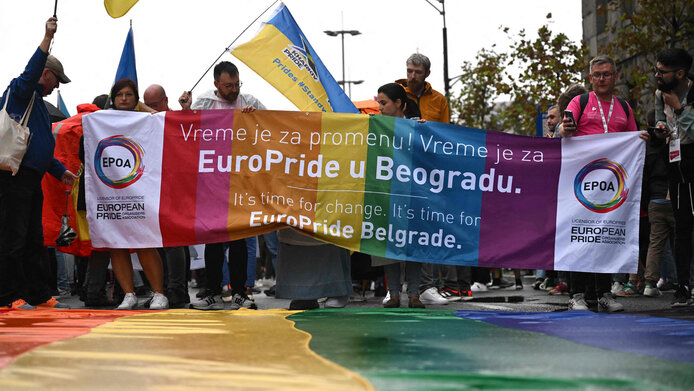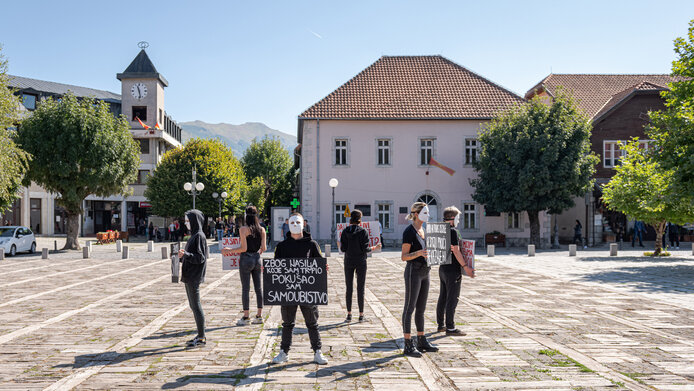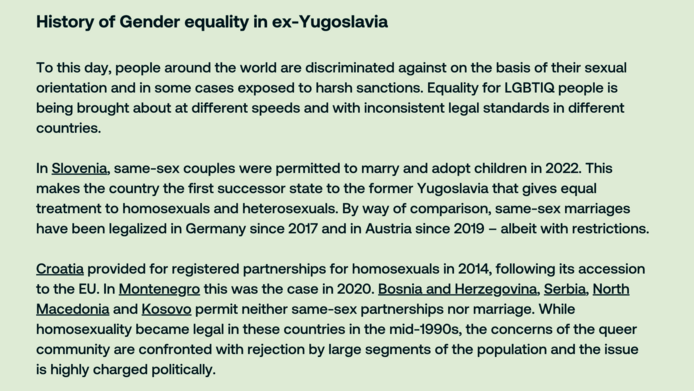Queer activism and polarized debates

Ana Brnabić’s appointment as Prime Minister of Serbia in 2017 came as a surprise to many – not only because she was the first woman to lead a government in the history of the conservative-led country, but also because she is very open about her homosexuality. A lesbian woman in a top political position proclaims openness and progress. In fact, the legal situation for LGTBIQ individuals in Serbia has improved in many ways since the 1990s. Homosexuality was decriminalized in 1994, having previously been considered an ailment. Incidentally, this was the classification also used by the World Health Organization (WHO) until 1990. The regulation for gender changes has also improved. Since 2011, health insurance has been covering two thirds of the cost of medical interventions, and in 2019 it became possible to register a gender change in one’s documents based on a psychiatric opinion. These improvements notwithstanding, sociologist Bojan Bilić is skeptical about automatically equating legal changes with progress, and he refers to the former Prime Minister's legal situation. “She is openly lesbian, lives in such a relationship and has a child. So far, however, there is no law in Serbia that would permit same-sex partnerships or adoptions.”
Having grown up in Vojvodina in northern Serbia, Bilić has just completed a three-year project at the University of Vienna which was funded by the Austrian Science Fund FWF. When he acquired his doctorate with a thesis on the anti-war movement in the former Yugoslavia around 12 years ago, he also met many LGBTIQ activists. “No surprise there,” he says, “they had common concerns and were demonstrating against patriarchy, authoritarianism and militarism.” Bilić was interested in how interethnic solidarity and cooperation between minorities developed across the new, supposedly hostile, nation states. At this time, Pride Parades began to be organized in the region, with the first taking place in Belgrade in 2001. It was ill-fated, however, and was remembered as the “massacre parade” after fights with hooligans escalated and numerous people were seriously injured.
More visibility – more intolerance?
In the successor states of Yugoslavia, nationalism and right-wing conservative parties followed in the wake of the end of communism. In other Eastern European countries, populists are also still inciting fears of homosexuality, feminism and trans people. The campaigns for traditional values are supported by the church and become louder as the counter-currents gain more visible profiles. “In post-Yugoslavia, the roots of homophobia and transphobia run deep,” says Bojan Bilić, who describes himself as an activist academic. Together with other research colleagues, he keeps in touch with many people from the LGBTIQ community and investigates the development of a movement that is often invisible in everyday life, especially in rural regions where queer people are hardly accepted in families and communities.
Croatia and Slovenia, EU member states that have prospered through tourism, do practice and tolerate diversity more openly, but that does not necessarily mean social acceptance. Also striving for EU membership, Serbia is prepared to make legal concessions. “However, this does not mean an automatic improvement in terms of tolerance, strengthening minority rights or anti-discrimination,” says Bilić alluding to the EU member Hungary. He considers the situation in his research region to be fragile and the scales could quickly tip again.
Personal details
Bojan Bilić is a psychologist and political sociologist. Between 2021 and 2024, he conducted research on LGBTIQ activism and mental health in post-Yugoslavia at the University of Vienna, funded by the Austrian Science Fund FWF under its Lise-Meitner Program.
A lecturer at international universities, Bilić is also an associate professor at the Faculty of Political Science at the University of Bologna and founder of the “Queering YU Network”, a collective of academics and activists.
PRIDE MONTH 2024
Political resistance from right and left
Despite the problematic start of the Belgrade Pride Parade in 2001, protests in the former Yugoslavia have grown in importance over the years. At the political level they are still confronted with resistance, however. The Serbian government, for instance, initially banned the Europride parade in 2022 because of security concerns. Ultimately, it still took place with a large police presence. A year later, thousands of people again took to the streets in Belgrade under the slogan “We’re not even close”.
For around ten years, more and more transgender people have been participating in the protests against violence and discrimination. NGOs such as the “Sarajevo Open Center” were set up and back their concerns with artist activism. This visibility has led to a rise in transphobia and to debates that have tainted the left-wing political spectrum and - also worldwide - feminist groups. Left-wingers and feminists see a threat to their movements in the debates about more rights for transsexuals.
Trans people as a threat
In his book “Transgender in the Post-Yugoslav Space” (2022), which is based on his research project, Bojan Bilić has dedicated a chapter to transphobia in the Serbian left-wing milieu. His investigations revealed long-standing conservative and neo-colonial attitudes among the left: “They undermine progressive values in a way that brings declared socialists dangerously close to their reactionary opponents, for example by obsessively attacking trans people, who are one of the most marginalized population groups.”
Over the past three years of his basic research project, Bilić and his colleagues have examined not only legal progress and political and social hurdles, but also the mental health of LGBTIQ people in the post-Yugoslav region. Depression and drug use are common consequences of discrimination and exclusion, especially among young people. In a follow-up project, Bilić wants to devote his scientific attention entirely to this topic and thus close a research gap in the post-socialist countries.
Publications
Bojan Bilić, Iwo Nord, Aleksa Milanović (Hg.): Transgender in the Post-Yugoslav Space: Lives, Activisms, Culture, Bristol University Press 2022
Further publications under: https://bildungswissenschaft.univie.ac.at/en/gender-studies/projects/lgbtq-activism-and-mental-health-in-the-post-yugoslav-space/







